Checklist Apps: Best Checklist Apps for Your Business
Checklist apps encompass the many software apps that allow you to create and organize the various tasks of your business into digital checklists that can then be stored and distributed wherever necessary.
Operandio is one of these checklist apps, however its extensive functionality and intuitive design sets it apart from its competitors. If you’re looking for checklist apps, Operandio is the app for you.
Let’s look into these checklist apps and find out why.

Why Might You Need Checklist Apps?
If you run any kind of establishment, you need apps that can help keep track of the extensive list tasks you and your staff face on a daily basis. Checklist apps automate processes that your staff shouldn’t need to worry about, giving them the time to focus their efforts on providing the best quality service.
But, earlier we said that Operandio is one of the best checklist apps for you. The reason is that Operandio is the checklist software solution with all the features you need so you can manage your business operations with the most ease and the best results.
If you’re looking for a complete checklist software package, you’re looking for Operandio.

Why does Operandio lead the best checklist apps?
Thanks to the Operandio app and its many features, you can spend less time on micromanaging your staff and more time on growing your business, all the while you can rest assured that your operations have been optimised. Operandio was built by business owners who know how difficult it is to run a process intensive business with a never ending list of daily, weekly and monthly tasks.
That’s how Operandio stands out from all other checklist apps. It doesn’t just create a list of tasks, it also aids your staff in completing all of those tasks as efficiently as possible.
What features does Operandio have?
What makes Operandio stand out from all other checklist apps is its list of many features, all of which work seamlessly to streamline your business procedures. Operandio provides an unprecedented level of control over the day-to-day operations of your workplace.
Template Library
Operandio is one of those apps that works for many industries. As a result, there are a wide variety of templates available for many business processes. However, you also have the option to build your processes from scratch. With apps like Operandio, you can run your business your way.
Progress Tracker
Apps like Operandio keep on top of everything with Operandio’s progress tracker. You can list and track all the tasks that need to be completed, monitor KPIs to make sure you’re hitting them, and provide feedback to your frontline employees.
Powerful Search
Operandio is one of those apps that creates a structured Knowledge Base with whatever information you give it. Both you and your staff can then easily search this Knowledge Base using simple keywords any time on any device.
Procedure Storage
When you need to use apps to update your procedures, Operandio makes the process as simple as possible. With apps like Operandio, you can update your procedures and notify your entire team at the click of a button. That way, your staff are always aware of what you expect of them.
Messaging Services
Operandio is one of those apps that helps you keep in constant contact with everybody in your business. Whether you want to use apps to message individual frontline workers, specific divisions, the staff of a specific branch location, or everybody in your entire business – you can contact them with ease.
Feedback Functionality
Thanks to apps like Operandio, you can use acknowledgements to prioritise important messages in a list that your staff can access and act upon. You can then provide feedback to ensure that your staff are always aware of potential improvements that could be made.
What can I do with apps like Operandio?
With apps like Operandio, you can take the hassle out of managing the day-to-day operations of your business. Operandio makes process management easy.
Optimize Your Workflows
- Create checklists and tasks for the processes specific to your business, whether they’re recurring or ad hoc.
- Make accountability a priority. Meet deadlines and ensure tasks are completed according to standard.
- List and delegate jobs to individuals, teams, divisions or an entire branch.
- Easily update processes as they change and keep your staff informed, even across multiple locations.
Centralise Your Business Knowledge
- Using Knowledge Base, you can create instructional videos, how-to guides, manuals, and standard operating procedures.
- Adapt the way you share knowledge to the needs of your company.
- Integrate instructional videos, guides, and documents into your daily processes and workforce communications.
- Take advantage of your smartphone or tablet to create how-to instructional videos and guides on the fly.
Enhance Staff Communication
- Connect with your entire workforce through the Communication Hub.
- Instantly provide staff with actionable feedback.
- Access business information and documents from any device.
- Confirm that important messages have been read.
What other kinds of checklist apps are there, and why is Operandio the standout?
Part of what makes Operandio so perfect is that it is so competitive when compared to the amount of checklist apps that are available. That is why we’ve compiled this list of the runners-up, so you can have an understanding of both the pros and cons for each of them.
- Any.do
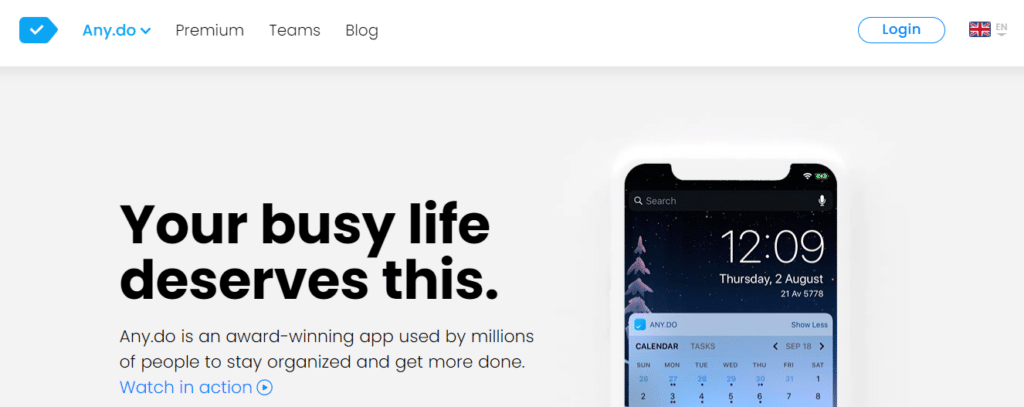
Any.do is one of those to-do list apps that has found itself a solid place in the task-management scene, with many businesses using it to manage their day-to-day operations.
One of the major benefits of apps like Any.do is that it has app support for all kinds of platforms, which makes it convenient to use. Many also praise its streamlined design, and its extensive number of features.
However, many have also cited the inconsistencies of Any.do’s quality amongst these various platforms, particularly those that run on iOS. Additionally, the free version has been labelled as comparatively restrictive, making it not as ideal for those looking to try before they buy.
- Asana

Asana is one of those productivity apps that specialises in facilitating team collaboration. Users can monitor and manage tasks, workflows and projects.
This program is known in particular for its flexibility, which lends itself to a particularly user-friendly design. Symptomatic of this is the timeline view, which makes managing dependencies easier. Additionally, Asana is a feature-rich program, in both its free and paid versions.
It’s worth noting that Asana is not ideal for work that is particularly graphics intensive. It also commands a higher asking price than a lot of its contemporaries, which is a bit of a deterrent for businesses.
- Google Tasks
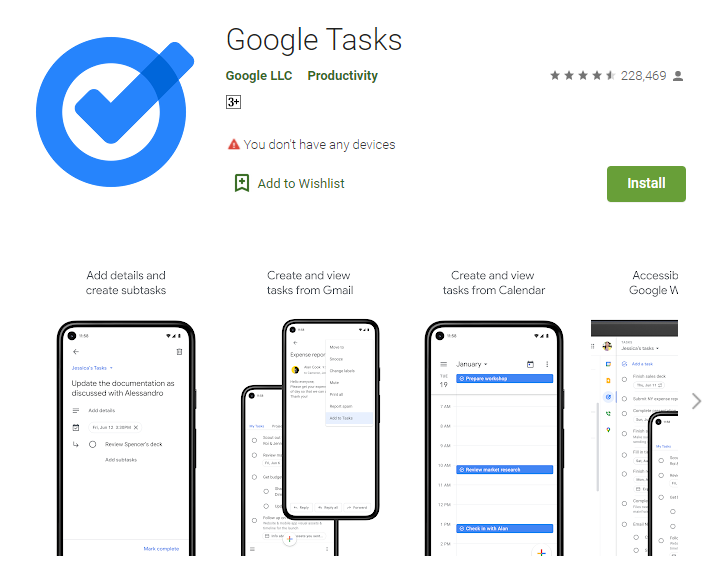
Google Tasks is Google’s very own task management tool that they have integrated with other apps including Gmail and Google Calendar. This service allows users to manage, capture and edit tasks across multiple devices at any time.
What makes Google Tasks stand out amongst other productivity tools is its accessibility, which comes standard with many of Google’s applications. Additionally, Google Tasks is completely free.
However, it’s not without its cons. Many have noted that Google Tasks is held back by its inability to tag others or share lists (a feature that other checklist apps have). Additionally, due to a lack of a standalone web app that allows users to work offline, Google Tasks can be very inconvenient to use offline.
- iAuditor
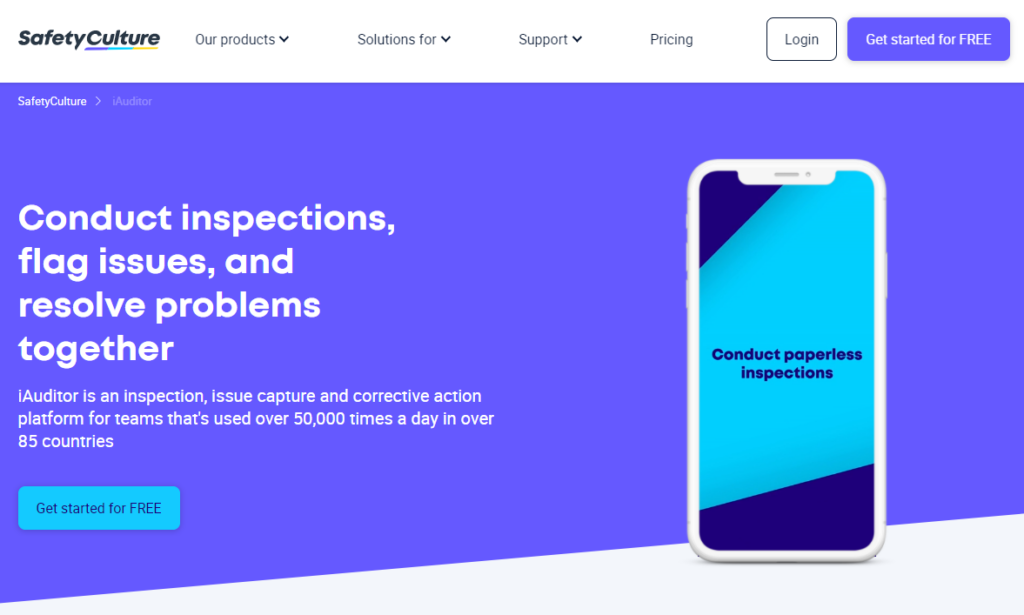
iAuditor is a widely used checklist app that allows users to build checklists, conduct inspections and create instant reports. Its many functions have made it a staple of many businesses for managing their tasks.
Many praise the ease with which apps like iAuditor creates custom audits. Thanks to the many features that it offers, and its solid customer support, iAuditor makes complicated tasks very simple for teams to accomplish.
However, its higher price (plus a lack of a free version or a free trial), and the limited customisation options for reports, have stopped iAuditor from standing out the way other checklist apps do.
- Microsoft To Do
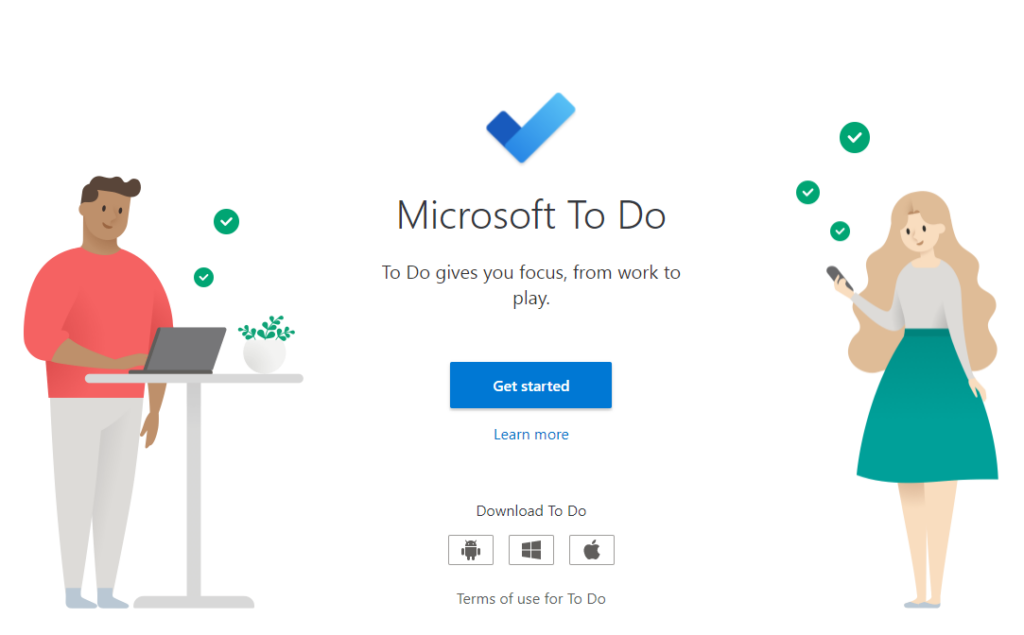
Much like Google, Microsoft has their own productivity app that they have integrated with their Microsoft 365 suite of apps. Microsoft To Do came to be after Microsoft acquired a checklist app called Wunderlist and updated it to reflect their software.
Microsoft To Do is not used in a business context to the degree of other checklist apps, but it is a free option that provides solid basic checklist apps features and syncs with Outlook tasks.
It is, however, missing quite a few features such as natural language input, priority rating, custom views, advanced searches and the ability to add details to subtasks.
- Omnifocus
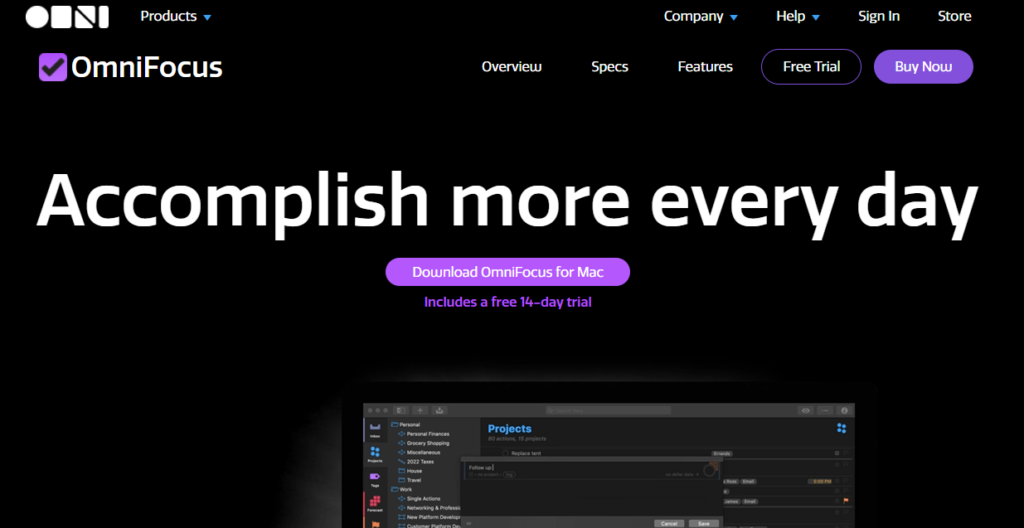
Omnifocus is a project management platform for iOS. With both desktop and mobile integration, Omnifocus can be used to organize all kinds of projects and tasks for business teams.
As far as project management apps are concerned, Omnifocus provides the main functionalities necessary for businesses to organize their operations. Many cite its ease of use and customizability as positives.
However, it has been criticised for its undeveloped mobile app, its learning curve for new users and its particularly high price point (especially considering you have to purchase updates separately). Additionally, its lack of Windows support has alienated a lot of businesses.
- Process Street
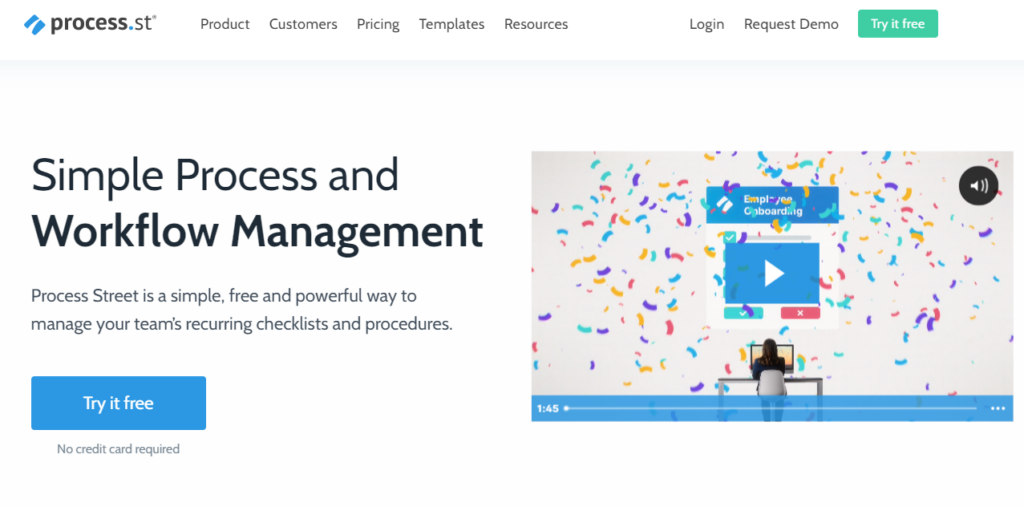
Process Street is one of those process management apps intended for the use of teams. It allows users to convert their business processes into actionable workflows for their staff.
This is considered to be a successful checklist app, as it provides the functionality necessary to manage tasks and processes in a way that streamlines a business’ day-to-day operations and allows for extensive documentation.
There are criticisms that have been levelled against it; from buggy performance, to an unintuitive UI, to the lack of an optimised mobile app. While not as revered as other entries on this list, it is still a respectable checklist app.
- Things
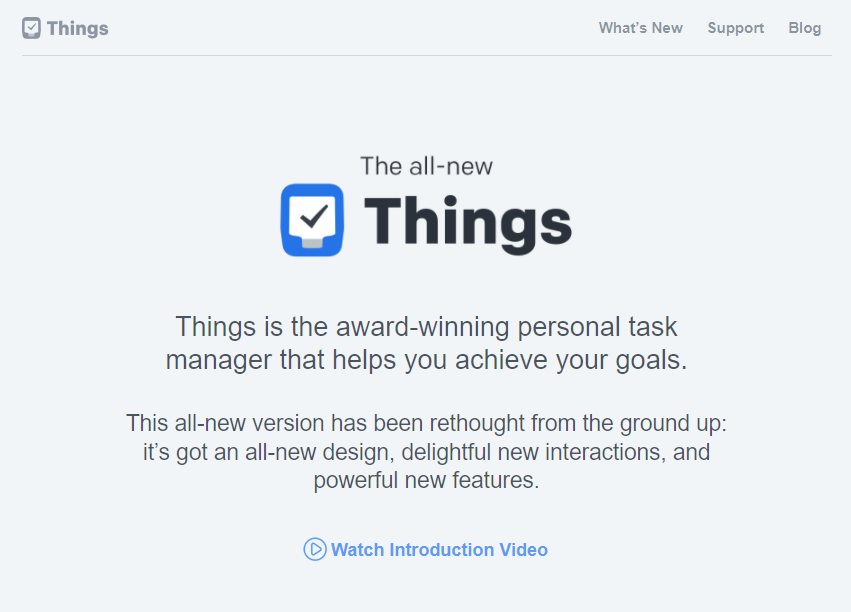
Things is an iOS app for managing projects. Business teams can use Things to organize all kinds of projects and tasks since it is both desktop and mobile compatible.
Things provides the main functionalities businesses need to conduct their operations effectively, as far as project management apps are concerned. Users praise its simplicity and list customizability.
Despite this, it has been criticised for its undeveloped mobile app, its learning curve for new users, and its high price point (especially since you need to purchase updates separately). A lot of businesses have also been put off by its lack of support for Windows.
- TickTick
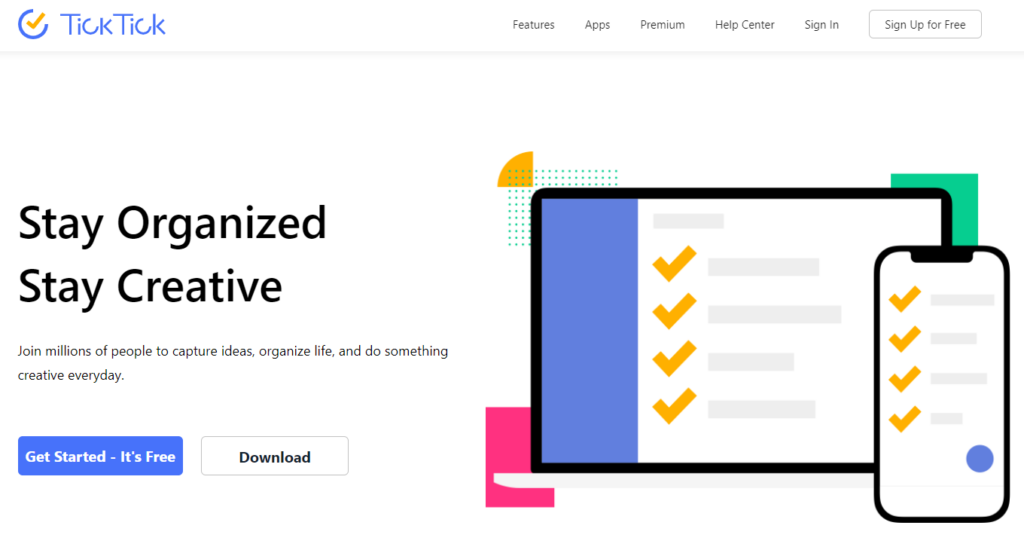
TickTick is a web-based checklist app that specialises in task management with apps for platforms such as Android, Windows and iOS.
It has been praised for being easy-to-use while effectively allowing businesses to organize and schedule their tasks. The syncing between the desktop and mobile apps, and its reasonable asking price, make it convenient to use.
However; many have also cited technical bugs, a difficult learning curve for new users and a lack of refinement compared to other checklist apps (particularly in the functionally limited free version), as points that are worthy of criticism.
- Todoist
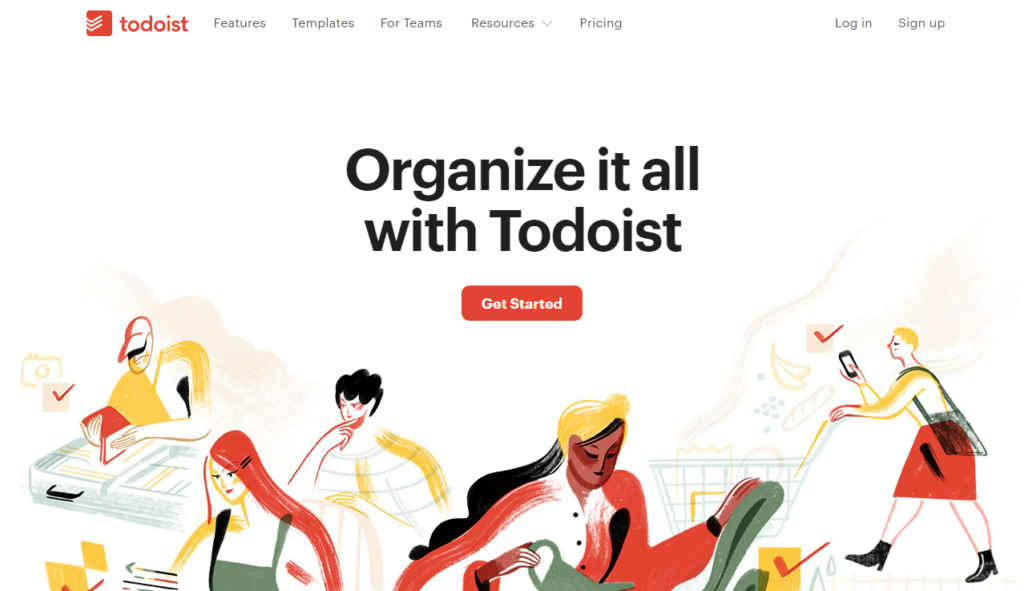
Todoist is a web based productivity app that helps businesses keep track of their tasks and projects across various platforms in different languages.
Todoist is renowned for its incredibly extensive functionality, resulting in an app that facilitates collaboration, streamlines a business’ list of processes, easily creates accountability and allows for easy task tracking.
However, relative to other apps, it also has some limitations for its key features. It can be difficult to message teammates, read documentation and track time specifically in Todoist. Additionally, like other apps, there is a paywall that can be quite obstructive for businesses that do not want to pay for it, as it limits important functions.
How much is Operandio checklist software going to cost me?
There are currently two pricing plans for Operandio checklist software.
- Business, a cost-effective way to manage day-to-day business operations, including the following:
- Unlimited process & task management
- Team communication & news feed
- Business Knowledge Base
- Manager dashboard & notifications
- Unlimited 24/7 support
- Enterprise, intended for large or complex organizations that require custom configurations, where you receive everything in the business plan plus:
- Detailed reporting
- Bespoke roles & permissions
- Custom organization structure
- Custom billing terms
- Dedicated Enterprise support
Request a demo today, and take control of your business.


